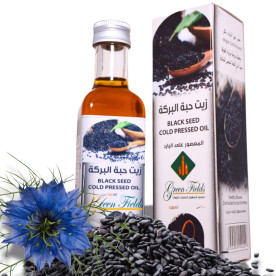Introduction
For centuries, traditional medicine has revered the remarkable benefits of natural remedies, with black seed oil standing out as a potent and versatile healer. Known as Nigella Sativa, Habet Al Barakeh (Seed of Blessing), or simply black seed, this ancient remedy finds its roots deep in the annals of history, including mentions in the Hadith and Tib Al Nabawi (Prophetic medicine) as a cure for everything but death. Even the Bible references this seed, highlighting its long-standing significance across various cultures, especially in the Middle East.
The Historical and Cultural Significance
Black seed oil's rich history is as fascinating as its health benefits. It's mentioned in Islamic literature, particularly the Hadith, signifying its importance in Prophetic medicine. This recognition is not just historical; it's a testament to the enduring trust in its healing properties. The oil, extracted from the seeds of the Nigella Sativa plant, a member of the Ranunculaceae family, has been a staple in traditional medicine for centuries.
Black Seed Oil in Modern Times
In our contemporary world, where modern medicine predominates, the World Health Organization (WHO) reports that still, only about 20% of the global population relies solely on conventional medicines. A significant 80% turn to herbs and plants for health solutions, with black seed oil being a prominent choice. This trend underscores a global shift towards more holistic, nature-based healing practices.
Composition and Health Attributes
The health benefits of black seed oil are primarily attributed to its volatile oils, with thymoquinone being the most prominent component. This compound lends the oil its powerful antioxidant properties, making it a formidable ally against various ailments.
Benefits and Uses
- Antimicrobial Properties: The oil is a natural combatant against bacteria, fungus, and yeast, making it a valuable tool in fighting infections.
2. Respiratory Health: Traditionally used for conditions like asthma and bronchitis, black seed oil can help alleviate respiratory issues.
3. Anti-inflammatory Effects: Its anti-inflammatory properties make it beneficial for conditions like rheumatism and other inflammatory diseases.
4. Antioxidant Power: The presence of thymoquinone means black seed oil is a potent antioxidant, which helps in combating oxidative stress in the body.
5. Digestive Health: It's known to aid in digestion and can help soothe stomach ailments.
6. Boosting Immunity: Regular consumption can strengthen the immune system, helping the body fend off illnesses.
How to Use Black Seed Oil
A recommended dose is one teaspoon of black seed oil per day. It can be taken alone, or to enhance its palatability, mixed with honey or yogurt. This simple incorporation into daily routine can yield significant health benefits.
Conclusion
In summary, black seed oil is not just a relic of ancient medicine; it's a living testament to the enduring wisdom of nature's remedies. As we continue to explore the symbiosis between traditional and modern medicine, black seed oil stands as a beacon of natural healing and preventive health. Whether as a supplement or a focal point in natural therapy, its multifaceted benefits make it a valuable addition to anyone's health regimen.
Note: It's important to remember that while natural remedies like black seed oil offer numerous health benefits, they should not replace professional medical advice or treatment. Always consult with healthcare professionals before starting any new health regimen, especially if you have pre-existing health conditions or are taking other medications.













